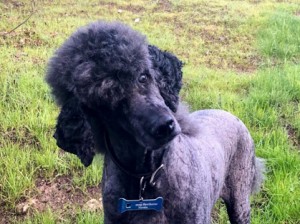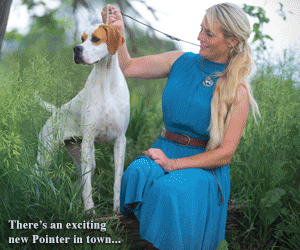Philanthropic Partnership Aids in Cancer Care
 Prince, a 9-year-old male standard poodle, was referred to the UC Davis veterinary hospital in 2017 for further evaluation of a lump on his right hind leg. His owner reported it has been there for about a year and had not changed in size.
Prince, a 9-year-old male standard poodle, was referred to the UC Davis veterinary hospital in 2017 for further evaluation of a lump on his right hind leg. His owner reported it has been there for about a year and had not changed in size.
Fine needle aspirates of the mass were taken by the Oncology Service and were consistent with probable inflamed mast cell tumor (MCT).
MCTs are the most common skin tumor in dogs. This tumor is a cancer of mast cells, which normally circulate throughout the body and can be active during certain types of infections or allergic disease. MCTs can vary dramatically in their biologic behavior, meaning that some of them can act very benign (and be cured with surgical resection) while some of them can act very malignantly and metastasize or spread to distant sites away from the primary tumor. There are three different histologic grades of MCT:
• Grade I MCT (low grade) tend to be less aggressive and remain local, not usually spreading to local lymph nodes.
• Grade II MCT are a more difficult group to assess, some behaving more like grade I, some behaving more like grade III, and many falling somewhere in between.
• Grade III MCT (high grade) tend to be much more aggressive tumors; they can be locally invasive, as well as commonly spreading to local lymph nodes and distant sites.
There is also another grading scheme that determines low grade versus high grade. It is impossible to know how a certain MCT will act without having a biopsy performed and looking at it under a microscope.
Surgical resection is the best treatment for local MCT. However, in some cases it is impossible to obtain a clean margin with surgery alone leaving some microscopic disease behind either locally where the primary tumor is located or distantly in lymph nodes or other organs. In those cases, radiation therapy or chemotherapy may be used as adjuvant therapy to treat microscopic disease left behind after surgery or on MCT that cannot be surgically resected. Also, because MCTs have a large inflammatory component, they can respond to anti-inflammatory medications such as steroids, if surgery is not possible.
Thankfully, Prince’s Grade I MCT was surgically removed with clean margins, and he did not require follow-up radiation or chemotherapy treatments.
To help with Prince’s care, his owner qualified for financial assistance through a generous grant from the Blue Buffalo Foundation’s support of the Petco Foundation pet cancer treatment program at the UC Davis veterinary hospital. The grant helps support treatments for domestic companion animals suffering from cancer. The project is designed to support pet parents of modest means or pet parents whose pets provide a service to others.
Prince is now 12 years old and still active and healthy.
Short URL: https://caninechronicle.com/?p=189392
Comments are closed












